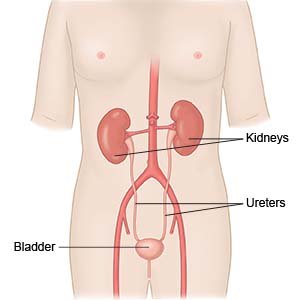Bladder Biopsy
Medically reviewed by Drugs.com. Last updated on Dec 2, 2024.
What do I need to know about a bladder biopsy?
A bladder biopsy is a procedure used to take a sample of your bladder tissue. The sample may be tested for cancer or other health problems. This procedure may be done during a cystoscopy. A cystoscopy is a procedure to look inside your urethra and bladder with a cystoscope. A cystoscope is a small tube with a light and camera on the end.
 |
How do I prepare for a bladder biopsy?
- Your healthcare provider will tell you how to prepare for this procedure. Tell your provider about all the medicines you currently take. You may need to stop taking medicines such as blood thinners, aspirin, and ibuprofen several days before your procedure. Contrast liquid may be used during this procedure. Tell your healthcare provider if you have ever had an allergic reaction to contrast liquid or to anesthesia.
- You may be told not to eat or drink anything for 8 hours before this procedure, or after midnight. Your provider will tell you which medicines to take or not take on the day of your procedure. You may be asked to drink a large amount of liquid before your procedure. Arrange for someone to drive you home after your procedure.
What will happen during a bladder biopsy?
- You may be given general anesthesia to keep you asleep and pain-free during your procedure. Your healthcare provider may instead use local anesthesia. You will not feel pain with local anesthesia, but you may be able to feel some pressure during your procedure.
- If a cystoscope is used, it will be placed through your urethra and into your bladder. Your healthcare provider will look at the walls of your urethra as the scope goes through to your bladder. Your bladder will be filled with clear liquid so your healthcare provider can see the inside of your bladder more clearly. CT or ultrasound pictures may be used to help your provider find the right area for the biopsy. A needle or other tools will be guided into your bladder. Your provider will use these to take a sample of tissue. The sample will be sent to a lab for tests.
What will happen after a bladder biopsy?
- You will need to rest after the procedure. Healthcare providers will help control your pain. They will also make sure you do not have large amounts of blood in your urine. Then you may be able to go home.
- You may see small amounts of blood in your urine for a short time. This is normal. It is also normal to have an increased need to urinate or trouble urinating. You may also have burning or mild discomfort in your bladder or kidney area when you urinate. These problems should only last a day or two.
- If you had general anesthesia, it may take at least 24 hours before you feel like your usual self. Do not drive or make important decisions for 24 hours.
What are the risks of a bladder biopsy?
You may develop a urinary tract infection (UTI) and need medicine to treat the infection. You may have pain when you urinate, or develop a blockage that keeps you from urinating. Your bladder may be damaged or rupture (break open) during the procedure. You may also bleed more than expected during the biopsy.
Care Agreement
You have the right to help plan your care. Learn about your health condition and how it may be treated. Discuss treatment options with your healthcare providers to decide what care you want to receive. You always have the right to refuse treatment. The above information is an educational aid only. It is not intended as medical advice for individual conditions or treatments. Talk to your doctor, nurse or pharmacist before following any medical regimen to see if it is safe and effective for you.© Copyright Merative 2024 Information is for End User's use only and may not be sold, redistributed or otherwise used for commercial purposes.
Further information
Always consult your healthcare provider to ensure the information displayed on this page applies to your personal circumstances.
